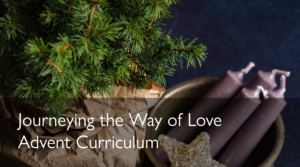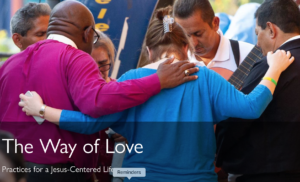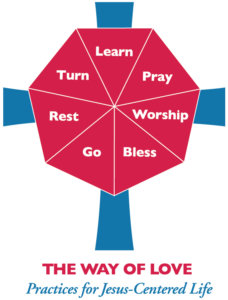Seven Spiritual Practices
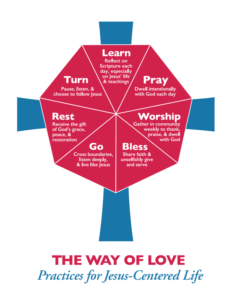
TURN: Pause, listen and choose to follow Jesus
As Jesus was walking along, he saw Levi son of Alphaeus sitting at the tax booth, and he said to him, “Follow me.” And he got up and followed him. – Mark 2:14
“Do you turn to Jesus Christ …?” – Book of Common Prayer, 302
Like the disciples, we are called by Jesus to follow the Way of Love. With God’s help, we can turn from the powers of sin, hatred, fear, injustice, and oppression toward the way of truth, love, hope, justice, and freedom. In turning, we reorient our lives to Jesus Christ, falling in love again, again, and again.
For Reflection and Discernment
– What practices help you to turn again and again to Jesus Christ and the Way of Love?
– How will (or do) you incorporate these practices into your rhythm of life?
– Who will be your companion as you turn toward Jesus Christ?
LEARN: Reflect on Scripture each day, especially on Jesus’ life and teachings.
“Those who love me will keep my word, and my Father will love them, and we will come to them and make our home with them.” – John 14:23
Grant us so to hear [the Holy Scriptures], read, mark, learn, and inwardly digest them. – Book of Common Prayer, 236
By reading and reflecting on Scripture, especially the life and teachings of Jesus, we draw near to God and God’s word dwells in us. When we open our minds and hearts to Scripture, we learn to see God’s story and God’s activity in everyday life.
For Reflection and Discernment
– What ways of reflecting on Scripture are most life-giving for you?
– When will (or do) you set aside time to read and reflect on Scripture in your day?
– With whom will you share in the commitment to read and reflect on Scripture?
PRAY: Dwell intentionally with God daily
He was praying in a certain place, and after he had finished, one of his disciples said to him,
“Lord, teach us to pray, as John taught his disciples.” – Luke 11:1
“Lord, hear our prayer.” – Book of Common Prayer
Jesus teaches us to come before God with humble hearts, boldly offering our thanksgivings and concerns to God or simply listening for God’s voice in our lives and in the world. Whether in thought, word or deed, individually or corporately, when we pray we invite and dwell in God’s loving presence.
For Reflection and Discernment
– What intentional prayer practices center you in God’s presence, so you can hear, speak, or simply dwell with God?
– How will (or do) you incorporate intentional prayer into your daily life?
– With whom will you share in the commitment to pray?
WORSHIP: Gather in community weekly to thank, praise, and dwell with God
When he was at the table with them, he took bread, blessed and broke it, and gave it to them.
Then their eyes were opened, and they recognized him. – Luke 24:30-31
Celebrant: Lift up your hearts.
People: We lift them to the Lord. – Book of Common Prayer, 361
When we worship, we gather with others before God. We hear the Good News of Jesus Christ, give thanks, confess, and offer the brokenness of the world to God. As we break bread, our eyes are opened to the presence of Christ. By the power of the Holy Spirit, we are made one body, the body of Christ sent forth to live the Way of Love.
For Discernment and Reflection
– What communal worship practices move you to encounter God and knit you into the body of Christ?
– How will (or do) you commit to regularly worship?
– With whom will you share the commitment to worship this week?
BLESS: Share faith and unselfishly give and serve
“Freely you have received; freely give.” – Matthew 10:8
Celebrant: Will you proclaim by word and example the Good News of God in Christ?
People: We will, with God’s help. – Book of Common Prayer, 305
Jesus called his disciples to give, forgive, teach, and heal in his name. We are empowered by the Spirit to bless everyone we meet, practicing generosity and compassion and proclaiming the Good News of God in Christ with hopeful words and selfless actions. We can share our stories of blessing and invite others to the Way of Love.
For Discernment and Reflection
– What are the ways the Spirit is calling you to bless others?
– How will (or does) blessing others – through sharing your resources, faith, and story – become part of your daily life?
– Who will join you in committing to the practice of blessing others?
GO: Cross boundaries, listen deeply and live like Jesus
Jesus said to them, “Peace be with you. As the Father has sent me, so I send you.” – John 20:21
Send them into the world in witness to your love. – Book of Common Prayer, 306
As Jesus went to the highways and byways, he sends us beyond our circles and comfort, to witness to the love, justice, and truth of God with our lips and with our lives. We go to listen with humility and to join God in healing a hurting world. We go to become Beloved Community, a people reconciled in love with God and one another.
For Discernment and Reflection
– To what new places or communities is the Spirit sending you to witness to the love, justice, and truth of God?
– How will you build into your life a commitment to cross boundaries, listen carefully, and take part in healing and reconciling what is broken in this world?
– With whom will you share in the commitment to go forth as a reconciler and healer?
REST: Receive the gift of God’s grace, peace, and restoration
Peace I leave with you; my peace I give you. I do not give to you as the world gives. Do not let your hearts be troubled and do not be afraid. – John 14:27
Blessed are you, O Lord … giving rest to the weary, renewing the strength of those who are spent. – Book of Common Prayer, 113
From the beginning of creation, God has established the sacred pattern of going and returning, labor and rest. Especially today, God invites us to dedicate time for restoration and wholeness – within our bodies, minds, and souls, and within our communities and institutions. By resting we place our trust in God, the primary actor who brings all things to their fullness.
For Discernment and Reflection
– What practices restore your body, mind, and soul?
– How will you observe rest and renewal on a regular basis?
– With whom will you commit to create and maintain a regular practice of rest?
DOWNLOAD this page to print and share:
PDF Document: Overview of The Way of Love
WORD Document: Overview of The Way of Love


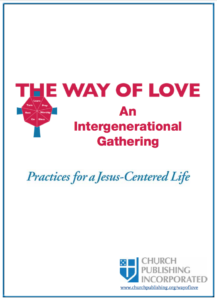
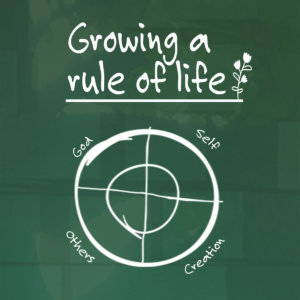
 When we live the practices of Christian faith, we join together with one another, with Jesus, and with the communion of saints across time and space in a way of life that resists death in all its forms – a way of life that is spilling over with the Life of God for creation, for our neighbors, and for ourselves.
When we live the practices of Christian faith, we join together with one another, with Jesus, and with the communion of saints across time and space in a way of life that resists death in all its forms – a way of life that is spilling over with the Life of God for creation, for our neighbors, and for ourselves.
